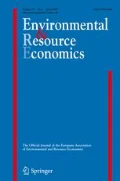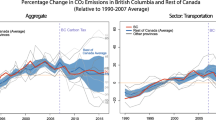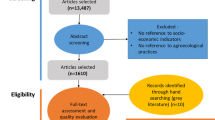Abstract
British Columbia (BC) introduced North America’s first carbon tax in 2008. An analysis of the impact of the BC carbon tax is of interest to various stakeholders in the jurisdiction where the tax was implemented. Other Canadian provinces and other countries contemplating a carbon tax policy are looking for insights on how to optimize potential positive and negative consequences. Given that government agri-environmental policies often emphasize farm-level support and environmental performance, there is interest in understanding the farm-level impacts of the carbon tax. The effect of the BC carbon tax on farm income and related production cost variables is investigated. Panel data from 2000 to 2015 are analyzed using both tabular and econometric approaches of the difference-in-difference method. The results indicate that the carbon tax is associated with a decline in net farm income-to-receipts ratios ranging between 8 and 12 cents per dollar of farm receipts. The analysis for costs-to-receipts ratios suggest that the carbon tax is directly related to higher commercial feed costs, farm labour costs, interest costs, and depreciation costs. Results of the regression analysis indicate that all the carbon tax effects are highly statistically significant. These findings can inform policy discussions about carbon tax effects on farmers.

Similar content being viewed by others
Notes
Carbon tax rate is expected to increase in the future by varying amounts, depending on the jurisdiction in Canada. For example, the BC carbon tax was set initially at CAD$10 tonne−1 CO2-e in 2008, and rose annually by CAD$5 to CAD$30 tonne-1 in 2012, and has since remained at that level with no planned increases in the near future. By comparison, Alberta launched a province-wide carbon tax at CAD$20 tonne-1 in January 2017, and expected to rise to CAD$30 tonne-1 on January 1, 2018. Similarly, under the proposed Pan-Canadian Framework on Clean Growth and Climate Change, carbon price will increase gradually from CAD$10 tonne-1 of CO2-e emissions in 2018, rising by CAD$10 annually to CAD$50 tonne−1 by 2022.
The outcome variables (i.e., farm income and production cost data) were available for only the 10 Canadian provinces but not for the three Territories. As a result, “other provinces” excludes the Territories.
References
Agriculture and AgriFood Canada (2016) An overview of the Canadian Agriculture and Agri-Food System. Ottawa. http://caes.usask.ca/members/_pdf/Overview%202016-Final_eng.pdf. Accessed 20 Feb 2017
Allan G, Lecca P, McGregor P, Swales K (2014) The economic and environmental impact of a carbon tax for Scotland: a computable general equilibrium analysis. Ecol Econ 100:40–50
Angrist JD, Pischke J-S (2009) Mostly harmless econometrics: an empiricists companion. Princeton University Press, Princeton
Antle JM, Capalbo SM, Johnson JB, Miljkovic D (1999) The kyoto protocol: economic effects of energy prices on Northern Plains dryland grain production. Agric Resour Econ Rev 28(1):96–105
Baranzini A, Goldemberg J, Speck S (2000) A future for carbon taxes. Ecol Econ 32(3):395–412
Beattie BR, Taylor CR, Watts MJ (2009) The economics of production, 2nd edn. Krieger Publishing Co., Malabar
Beck M, Rivers N, Wigle R, Yonezawa H (2015) Carbon tax and revenue recycling: impacts on households in British Columbia. Resour Energy Econ 41:40–69
Bhorat H, Kanbur R, Stanwix B (2014) Estimating the impact of minimum wages on employment, wages, and non-wage benefits: the case of agriculture in South Africa. Am J Agric Econ 96(5):1402–1419
Binkley A (2016) Carbon tax alarms agriculture groups. Manitoba Co-operator. http://www.manitobacooperator.ca/news-opinion/news/carbon-tax-alarms-agriculture-groups/. Accessed 3 Feb 2017
Blair J (2016) Farmers fear big price hit from carbon tax. Alberta Farmer Express. http://www.albertafarmexpress.ca/2016/10/24/farmers-fear-big-price-hit-from-carbon-tax/. Accessed 3 Feb 2017
Blanco M (2016) Policy impact assessment. In: Shrestha S, Barnes A, Ahmadi BV (eds) Farm-level modelling: techniques, applications and policy. CABI, Boston
Brenner M, Riddle M, Boyce JK (2007) A chinese sky trust? Distributional impact carbon charges and revenue recycling in China. Energy Policy 35:1771–1784
British Columbia Ministry of Finance (2016) Budget and fiscal plan: 2016/17-2018/19. http://bcbudget.gov.bc.ca/2016/bfp/2016_Budget_and_Fiscal_Plan.pdf. Accessed 1 Feb 2017
Campion-Smith B (2016) Justin Trudeau’s Liberals unveil plan to price carbon. The Toronto Star (Online version). https://www.thestar.com/news/canada/2016/10/03/justin-trudeaus-liberals-unveil-plan-to-price-carbon.html. Accessed 5 Jan 2017
Ekins P, Speck S (1999) Competitiveness and exemptions from environmental taxes in Europe. Environ Resour Econ 13(4):369–396
Elgie S (2012) British Columbia’s carbon tax shift: the first four years. Research Report. Sustainable Prosperity, University of Ottawa, Ottawa
Elgie S, McClay J (2013) BC’s carbon tax shift is working well after four years (attention Ottawa). Can Public Policy 39(Supplement 2):S1–S10
Fischer C, Newell R (2008) Environmental and technology policies for climate mitigation. J Environ Econ Management 55(2):142–162
Fisher C, Fox AK (2009) Combining rebates with carbon taxes: optimal strategies for coping with emissions leakage and tax interactions. Resources for the Future Discussion Paper No. 09-12. https://ssrn.com/abstract=1408692 or http://dx.doi.org/10.2139/ssrn.1408692
Francl T, Nadler R, Bast J (1998) The Kyoto protocol and U.S. agriculture. Heartland Policy Study No. 87, Heartland Institute, Chicago (October 30)
Harrison K (2012) A tale of two taxes: the fate of environmental tax reform in Canada. Rev Policy Res 29(3):383–407
Khandker SR, Koolwal GB, Samad HA (2010) Handbook on impact evaluation: quantitative methods and practices. The World Bank, Washington DC
Konyar K, Howitt RE (2000) The cost of the Kyoto protocol to U.S. crop production: measuring crop price, regional acreage, welfare, and input substitution effects. J Agric Res Econ 25(2):347–367
Lechner M (2010) The estimation of causal effects by difference-in-difference methods. Found Trends Econom 4(3):165–224
Lin B, Li X (2011) The effect of carbon tax on per capita CO2 emissions. Energy Policy 39(9):5137–5146
Liu Y, Lu Y (2015) The economic impact of different carbon tax revenue recycling schemes in China: a model-based scenario analysis. Appl Energy 141:96–105
Martin R, De Preux LB, Wagner UJ (2014) The impact of a carbon tax on manufacturing: evidence from microdata. J Public Econom 117:1–14
Meng S (2015) Is the agricultural industry spared from the influence of the Australian carbon tax? Agric Econ 46:125–137
Meng S, Siriwardana M, McNeil J (2013) The Environmental and economic impact of the carbon tax in Australia. Environ Resour Econ 54:313–332
Murray B, Rivers N (2015) British Columbia’s revenue-neutral carbon tax: a review of the latest “grand experiment” in environmental policy. Energy Policy 86:674–683
Olale E, Henson S (2013) The impact of income diversification among fishing communities in Western Kenya. Food Policy 43:90–99
Rivers N, Schaufele B (2015) The effect of carbon taxes on agricultural trade. Can J Agric Econ 63(2):235–257
Schmitz A, Moss CA (2015) Mechanized agriculture: machine adoption, farm size, and labor displacement. AgBioForum 18(3):278–296
Statistics Canada (2014) Net farm income—agriculture economic statistics (21-010-X). http://www.statcan.gc.ca/pub/21-010-x/21-010-x2014002-eng.pdf. Accessed 17 Feb 2017
Statistics Canada (2017) Table 002-0001—farm cash receipts, annual (dollars), CANSIM (database). Accessed 8 Feb 2017
Stavins R (1995) Transaction costs and tradable permits. J Environ Econ Manag 29(2):133–148
Sustainable Prosperity (2012) British Columbia’s carbon tax shift: the first four years. Research Report. Sustainable Prosperity, University of Ottawa, Ottawa. http://www.sustainableprosperity.ca/sites/default/files/publications/files/British%20Columbia’s%20Carbon%20Tax%20Shift.pdf. Accessed 7 Jan 2017
Tol RS (2007) The impact of a carbon tax on international tourism. Transp Res Part D Transp Environ 12(2):129–142
Welsch H (1996) Recycling of carbon/energy taxes and the labor market. Environ Resour Econ 8:141–155
Wissema W, Dellink R (2007) AGE analysis of the impact of a carbon energy tax on the Irish economy. Ecol Econ 61(4):671–683
Author information
Authors and Affiliations
Corresponding author
Additional information
Publisher's Note
Springer Nature remains neutral with regard to jurisdictional claims in published maps and institutional affiliations.
Appendix
Rights and permissions
About this article
Cite this article
Olale, E., Yiridoe, E.K., Ochuodho, T.O. et al. The Effect of Carbon Tax on Farm Income: Evidence from a Canadian Province. Environ Resource Econ 74, 605–623 (2019). https://doi.org/10.1007/s10640-019-00337-8
Accepted:
Published:
Issue Date:
DOI: https://doi.org/10.1007/s10640-019-00337-8




